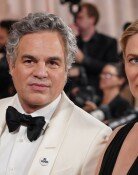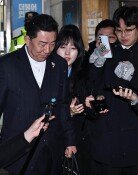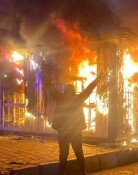U.S. Begins NE Asia Diplomatic Push
U.S. Begins NE Asia Diplomatic Push
Posted November. 04, 2006 03:22,
The Bush administration has dispatched two State Department undersecretaries to Northeast Asia to negotiate on the strategy and implementation of sanctions against North Korea. On November 2, the state department announced that U.S. delegates led by Nicholas Burns, undersecretary for Political Affairs, and Robert Joseph, undersecretary for Arms Control and International Security, will visit Japan (November 5-6), China (November 7-8), and South Korea (November 8-10). Working groups from the U.S. Treasury department in charge of the sanctions on the North and the U.S. National Security Council will also join the envoys. Christopher Hill, Assistant Secretary of State for East Asian and Pacific Affairs, will not join the team.
It is unprecedented that two key undersecretaries of state out of the six will be traveling together to Northeast Asia. Burns has been in charge of negotiations and mediation while Joseph is the seasoned diplomat in charge of the PSI. Before the delegations dispatch, Condoleezza Rice, Secretary of the State, said regarding the visit on American TV, We have both carrots and sticks.
The two will go together to Japan and China. Robert Joseph, however, will go to Beijing and head toward Moscow without a stopover in Seoul. A diplomatic source in Washington said, Korea should not be distracted by the question of whether Robert Joseph comes to Seoul. Instead, it should closely watch on what Burns briefcase is carrying. In other words, the Korean government does not have to pay too much attention on whether Joseph visits Seoul as he carries sticks for the North. Instead, it should note the meaningful requests from Burns.
The U.S. is thought to want decisive action from Pyongyang when it returns to the negotiating table. It could ask for the immediate suspension of the 5MK-Yeongbyeon nuclear reactor in the North and the demonstration of North Koreas willingness to give up nuclear ambitions by self-reporting clandestine nuclear reactors.
To persuade the North to accept these requests, support from Korea and China is critical. Burns may ask Seoul not to back the North. However, some expect that he will not request tough measures.
A source said, The crucial guideline is Bushs call for tangible results. With Bushs demand, Korea and China are not likely to face tough requests from the U.S. Some suspect that Joseph believes that it is not right time to discuss the North Korean issue due to Seouls ambiguous attitude toward it. The Korean government has delayed its active participation in the PSI and continued inter-Korean economic cooperation, including Mr. Geumgang tours. However, others analyze that it is due to the concern that his visit to Seoul could be counterproductive as the Korean government is still divided over the expansion of its participation in the PSI. A government official said, The fact that the Korean government is starkly divided on the PSI issue must be considered. Furthermore, Robert Joseph already visited Korea with Rice last month and had a close consultation on the PSI issue.
srkim@donga.com weappon@donga.com







